- Home
- James L. Swanson
End of Days Page 2
End of Days Read online
Page 2
“Go get her,” he told her, as he released his grip from her neck.
“Go get her yourself.”
This attack had broken her spirit. Now she felt ashamed and worthless. She went into the bathroom. She took the clothesline she used to dry her daughter’s diapers. She tied the rope around her neck. He wouldn’t have to kill her. She would do it for him.
He caught her in the act before she could finish. He carried her back to the bedroom. “Forgive me,” he pleaded. “I didn’t mean to do what I did.” Then he mouthed the classic wife beater’s defense. “It’s your fault. You saw what a mood I was in. Why did you make me so mad?”
She said she had only tried to do what he had just tried to do to her. “I’m sick of it, Alka.” That name, along with Alek, was one of the names she called him when they had lived in Russia. His American first name sounded very odd—Asian—to Russian ears.
“Every day we fight, and for no reason,” she complained. “We fight over things so tiny, normal people wouldn’t speak of them at all.”
“I never thought you’d take it so hard,” he replied. “Pay no attention to me now. You know I can’t hold myself back.” It was not his fault, he was suggesting, that he could not control his temper. “Try to understand, you’re wrong sometimes, too”—as if blaming her justified the slaps and punches and choking. “Try to be quiet when you can. For God’s sake, forgive me. I’ll never, ever do it again. I’ll try and change if you’ll only help me.”
“But why, Alka, why do you do it?”
“Because I love you. I can’t stand it when you make me mad.”
And their neighbors could not stand him when he got mad. One of them once reported him to the building manager, Mahlon Tobias, complaining, “I think he’s really hurt her this time.” On another occasion a neighbor predicted, “I think that man over there is going to kill that girl.” The building’s owners showed up to confront him with an ultimatum. Cut it out, or get out, they told him. He did not tell his wife about the warning. Instead, a few days later, he told her they were moving. He claimed he had found them a better apartment at 214 West Neely Street. They moved there on March 2, 1963.
Now, in their new apartment, not long after he had promised to never hit her again, he threatened to beat her if she ever intruded into his tiny private room.
SHE KNEW he had been practicing with the rifle. She had never seen him fire it, but when he went out by himself, he would sometimes say, “Well, today I will take the rifle along for practice.” He had bought at least one small cardboard box of 6.5mm bullets manufactured by the Western Cartridge Company. He knew his way around a rifle. His training in the United States Marine Corps had taught him all he needed to know about that.
On one occasion, she had discovered in their apartment photographs of a strange house. What could it mean? “I asked him what kind of photographs are these?” He refused to answer.
He could never hold a job for long. On April 1, he was fired from his current one at the Jaggars-Chiles-Stovall printing company. He had hurried through his assignments, made careless mistakes, and had to redo too many jobs. He was brusque with coworkers, refusing to sit with them at lunch and often shouldering them aside in the darkroom. When his supervisor gave him his notice, all he did was stare at the floor, listen without protest, and reply, “Well, thanks.” Then he just walked away.
He needed the money, but he did not beg to keep his job. He did not even seem to care. He had already gotten what he wanted—he had used the office equipment to make himself fake identification cards and had developed prints of the photographs of him posing with his rifle. It was as though his mind was distracted by something more important than holding a job. Saturday, April 6, was his last day at work. Within the next four days, he would cross the line from malcontent to madman.
On the morning of Wednesday, April 10, he put on a gray suit and white shirt, the kind of outfit a man looking for a job might wear. After waiting a week and a half to tell her, he admitted to his wife that he had been fired. “I don’t know why,” he whined. “I tried. I liked that work so much.” He did not reveal that he had been let go for poor performance and a bad attitude. He offered a grander excuse that shifted the blame from himself to others. “But probably the FBI came and asked about me, and the boss just didn’t want to keep someone the FBI was interested in. When will they leave me alone?” She accepted his explanation. She knew the government had had an ongoing interest in them since they had moved from Russia to the United States.
When he left the house that morning, his wife assumed he would spend all day looking for work. Whenever he needed a job, it was his habit to buy a newspaper, scour the want ads for leads, and walk the streets from employer to employer.
But he did not look for jobs that day. He had only one appointment to keep, and he was not due there for another ten or twelve hours. How he spent the day remains a mystery. He was in no hurry to reach his destination, the house at 4011 Turtle Creek Boulevard, in one of the better neighborhoods in town. Long ago he had decided against a daytime attack. It was too risky: Too many people, too many potential witnesses, too great a chance that the police might hunt him down. No, he would strike under the cover of darkness.
He arrived at his destination a little before nine P.M. CST. He went to the spot where he had secreted his rifle a few days earlier. It was still there—he had hidden it well. He took his position. Everything had gone as he had planned. No one saw him tote the weapon to the house. Once again, he placed the residence under surveillance, just as he had done several times before on his practice missions. He walked around to the back of the house. No one saw him crouch down. He knew that the man was in Dallas. And he was sure that at this moment his victim was somewhere inside that house on Turtle Creek Boulevard. The man he had marked for death had been in command of thousands of American soldiers, but tonight they could not protect him. He was alone.
AT THIS moment, President John F. Kennedy was in the White House, 1,200 miles away. The day before, in a 3:00 P.M. televised ceremony in the flower garden, he had conferred honorary American citizenship upon Winston Churchill. It was the first time such an honor had been given to a foreign statesman. Ancient Sir Winston, too frail to travel to the United States, watched the event on television at his home in London, via a live satellite broadcast.
After the ceremony, John and Jacqueline Kennedy hosted a reception for 250 guests in the East Room. Earlier this day, April 10, Kennedy had addressed a gathering of economics students from abroad, sent a memo to place veterans of the Peace Corps in other government jobs, and proposed the creation of a National Service Corps. Soon he would retire to bed on the second floor in the mansion’s residence.
But on this night, Lee Harvey Oswald did not care where the president of the United States was. He did not want to kill John F. Kennedy.
The man Oswald wanted to kill—Major General Edwin A. Walker, United States Army—was less than forty yards away.
Oswald’s fixation with Walker probably began when the October 7, 1962, issue of the Communist Party newspaper, the Worker, published not one but three inflammatory articles demanding that President Kennedy “arrest and prosecute General Edwin Walker . . . for murder and rebellion against the democratic authority of the Constitution of the United States.”
After a distinguished military career—West Point graduate, decorated World War II and Korean War combat officer—Walker received orders from President Eisenhower in 1957 to quell civil disturbances during the desegregation of Central High School in Little Rock, Arkansas. Although he did a superb job of protecting the black students, Walker thought it was wrong to use the United States Army to flout states’ rights and desegregate the South against its will. He became obsessed with the idea that Communists had infiltrated the U.S. government, and he later accused Harry Truman and Eleanor Roosevelt of being “pink”—the hot-button word for communist sympathizers. President Kennedy relieved him from command, and Walker resigned his commissio
n. He became a political activist, giving provocative speeches throughout the nation.
On September 30, 1962, the day after Walker made virulent televised remarks opposing the admission of a black student—James Meredith—to the University of Mississippi, a campus riot left two dead and seventy-five wounded. After Walker was charged with insurrection and the violation of several federal laws, Attorney General Robert Kennedy overreached and tried to commit the general to a mental institution. The Worker reported that Walker “led the brick-throwing students” and warned that the racial violence at Ole Miss was the “first attempt by a conspiracy of racists and ultra-Right generals to renounce the federal constitution, to open the path to tyranny over the negro people . . . and the subjection of the entire nation to a fascist type rule.”
In February 1963, Edwin Walker was in the news again when he gave a speech that seemed to advocate that the United States invade Cuba and assassinate Fidel Castro. It was too much for Lee Oswald. As soon as his guns arrived in the mail, he would show that he was “ready for anything.” His justifications for the assassination came straight out of the pages of the Worker. Edwin Walker despised President Kennedy. In trying to kill Walker, Oswald was attempting to assassinate one of JFK’s bitterest political enemies. Subsequent developments would expose the irony in that.
MOST OF the lights in the house were on. The shades were up.
Oswald looked through the windowpanes, searching for General Walker.
Then Lee spotted him, clear as day in a brightly lit room, sitting at a desk while he worked on his federal income-tax return. The deadline was in five days. Oswald raised his rifle. He leveled the barrel to the horizontal and took aim. He acquired the general in his telescopic sight. He superimposed the crosshairs over his head. He was so close. Walker was no more than 120 feet away.
Oswald steadied his shooting stance, verified the target in his scope, and squeezed the trigger. He was certain he could not miss. The man’s head was dead center in the crosshairs.
The rifle fired. The supersonic bullet cracked the air.
BY AROUND nine P.M., Marina Oswald began to worry. Her husband should have returned home by now. She knew he must be up to no good. She decided to search their apartment for some clue about where might have gone. Despite his past threats, she decided to search his private office. “Then I went into his room. Somehow, I was drawn into it. . . . I was pacing around. Then I saw the note.” It was in his handwriting, and it was in Russian, her native language. That meant it was for only her to understand. She still could not speak or write English well. To keep her dependent on him, Oswald had discouraged her from learning the language. They always spoke to each other in Russian.
A single key sat on top of the note. She moved the key, picked up the sheet of paper, and began reading. The note contained eleven numbered paragraphs. At first the words confused her. The first point mentioned his post office box. “This is the key,” Lee disclosed, “to the mailbox which is located in the main post office . . . on Ervay Street.” Yes, the key was there. He had left it for her just as he had written. But why? And why was he telling her how to locate his post office box?
The second paragraph was more mysterious: “Send the information as to what has happened to me to the Embassy and include the newspaper clippings.” Marina didn’t know what her husband was talking about. What was he doing tonight that a newspaper might write about? The paragraph continued. “I believe that the Embassy will come to your assistance on learning everything.” Marina had no idea what those words meant.
The third through fifth points dealt with petty financial concerns: “I paid the house rent on the 2d so don’t worry about it . . . recently I also paid for water and gas . . . the money from work will possibly be coming . . . to our post office box . . . go to the bank and cash the check.”
The sixth through eighth points covered Lee’s personal property: “You can either throw out or give my clothing . . . away. Do not keep these. However I prefer that you hold on to my personal papers . . . certain of my documents are in the small blue valise . . . the address book can be found on my table in the study.”
The ninth point reminded Marina that “we have friends here,” implying that a small circle of Russian-born émigrés living in Dallas would help take care of her. Then he added that “the Red Cross also will help you.”
The penultimate point was about money. Lee Oswald had provided a meager sum to care for his family: “I left you as much money as I could, $60 . . . you and the baby . . . can live for another two months using $10 per week.”
Yes, there was no doubt now. Lee Harvey Oswald had abandoned his wife and infant daughter.
Then Marina got to the eleventh point and her husband’s final, bizarre instruction.
She could not believe it.
This was not a farewell note from an estranged husband. This was a note from a man who must have done something terrible.
“If I am alive and taken prisoner . . . the city jail is located at the end of the bridge through which we always passed on going to the city (right in the beginning of the city after crossing the bridge).”
These handwritten instructions advising Marina what to do in case Lee vanished or was killed or arrested gave no hint about the awful things he had planned to do that night—what he might be doing right now while she was reading the note. She had no clue and did not know what to do.
So she just waited for him to come home.
THE BULLET was in midflight, rocketing toward General Walker’s head. He had survived two wars. He had commanded an infantry regiment in battle. Now he was about to be murdered in the tranquility of his own home. “It was right at 9 o’clock,” Walker noted, “and most of the lights were on . . . and the shades were up. I was sitting down behind a desk . . . with my head over a pencil and paper working on my income tax when I heard a blast and a crack right over my head.”
The bullet, traveling at 1,700 or 1,800 feet per second, had punched through the window glass and missed Walker’s head by less than an inch.
Oswald had missed! But he had not fired an inaccurate shot. He did have his target in his sights. The general should be dead. But on its way into the house, the bullet nicked part of the wood window frame, which altered its flight path just enough to save the general’s life.
At first, Walker did not suspect gunfire. “I thought that possibly somebody had thrown a firecracker, that it exploded right over my head through the window right behind me. Since there is a church back there, often there are children playing back there.” Walker assumed that kids had tossed the fireworks through an open window missing its screen, but he was wrong. “Then I looked around and saw that the screen was not out, but was in the window, and this couldn’t possibly happen, so I got up and walked around the desk and looked back where I was sitting and I saw a hole in the wall.”
It did not take the general long to figure out that somebody had shot at him.
Lee Harvey Oswald could not tell if his first shot had killed Walker. The Mannlicher-Carcano had a six-round clip. Oswald could have operated the bolt, ejected the empty brass cartridge, chambered a fresh round, and fired again. But he did not attempt a second shot. Either he convinced himself he had killed the general—how could he miss at that range?—or he was too skittish to stand his ground and fire a second round. He decided to run away.
It was a wise choice. When Walker realized he had been fired upon, he did not duck for cover, cower on the floor, and hide. Instead he made a snap decision to hunt for the sniper.
“I noticed there was a hole in the wall, so I went upstairs and got a pistol and came back down and went out the back door, taking a look to see what might have happened.”
Walker barged outside and headed in Oswald’s direction. But Lee was already running away. Walker searched the area—“I went about halfway out to the alley”—but he found no one. If Oswald had lingered in the vicinity, hoping to fire multiple shots, Walker might have caught him in the open and sh
ot him to death.
Instead, Lee’s legs increased the distance between him and the pursuing general. Oswald fled into the night and hid his rifle in the same spot where he had concealed it prior to the assassination attempt. He didn’t want to get caught with the weapon in his possession on the way home.
In a few days, when it was safe, he planned to go back and retrieve the rifle from its hiding place. For now, Oswald made his way to a bus stop and rode home. At this moment, after months of careful planning, he did not know whether he had succeeded or failed in killing Edwin Walker.
MARINA OSWALD waited for Lee to come home—ten thirty, eleven, eleven thirty. Where was he? What was he doing?
Before midnight, Lee burst into the house. He was in an excited and agitated state. His face was pale. He was sweating.
Marina spoke first. “What happened?”
“I shot Walker!”
“Did you kill him?” Marina asked.
“I don’t know.”
“My God,” Marina said. “The police will be here any minute.”
She noticed that Lee was unarmed. “What did you do with the rifle?”
He told her he had buried it.
Marina waved the note he had left her and demanded, “What is the meaning of this?” Lee did not want to talk anymore. After his confession, “He told me not to ask him any questions. He only told me that he had shot at General Walker.”
Lee said that he did not know whether or not he had killed Walker. Then he revealed how he had fled the crime scene. He told Marina he had run “several kilometers” and then caught a bus home. To avoid being spotted by eyewitnesses, he decided not to stand at a bus stop too close to Walker’s house.
Within a minute or two of returning to his apartment, Lee Oswald switched on the radio. He listened, hoping to hear a news flash about the attack and confirmation that the general was dead. Marina listened with him, “But there were no reports.” Not one radio station broadcast a bulletin about the Walker shooting. That was odd. The assassination of an army general as well-known as Edwin A. Walker was sure to make the news.

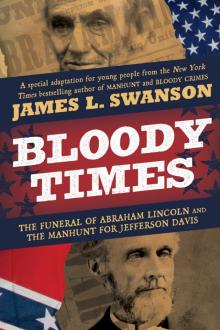 Bloody Times: The Funeral of Abraham Lincoln and the Manhunt for Jefferson Davis
Bloody Times: The Funeral of Abraham Lincoln and the Manhunt for Jefferson Davis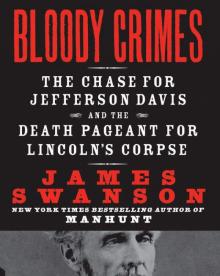 Bloody Crimes: The Funeral of Abraham Lincoln and the Chase for Jefferson Davis
Bloody Crimes: The Funeral of Abraham Lincoln and the Chase for Jefferson Davis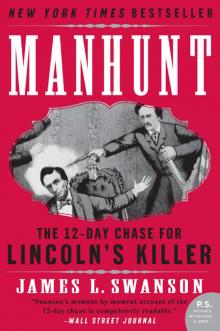 Manhunt: The 12-Day Chase for Lincoln's Killer
Manhunt: The 12-Day Chase for Lincoln's Killer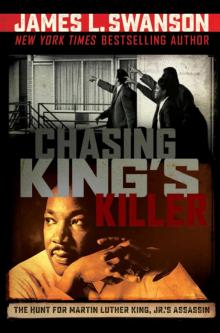 Chasing King's Killer: The Hunt for Martin Luther King, Jr.'s Assassin
Chasing King's Killer: The Hunt for Martin Luther King, Jr.'s Assassin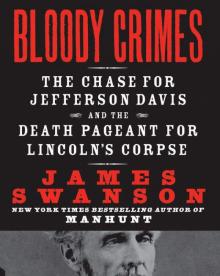 Bloody Crimes
Bloody Crimes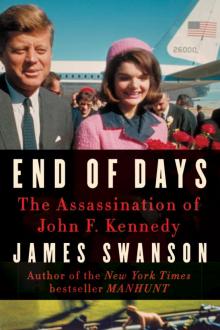 End of Days
End of Days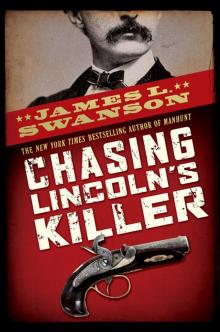 Chasing Lincoln's Killer
Chasing Lincoln's Killer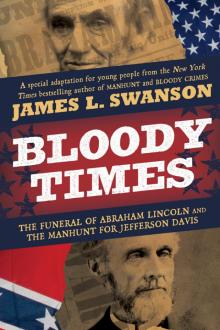 Bloody Times
Bloody Times Manhunt
Manhunt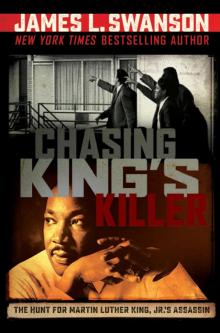 Chasing King's Killer
Chasing King's Killer